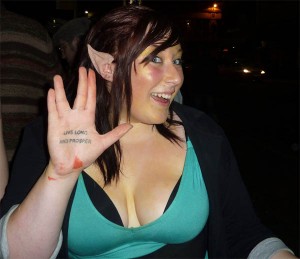Edmonton Sci-Fi fans boldly go where everybody knows their names
 In the era of online, you don’t just join a group that likes science fiction. You find the group that obsesses about the particular “Star Trek” series or Ray Bradbury books that you yourself obsess over.
In the era of online, you don’t just join a group that likes science fiction. You find the group that obsesses about the particular “Star Trek” series or Ray Bradbury books that you yourself obsess over.
After all, if you love “Doctor Who” (Russell T. Davies-written episodes only) but hate it when people quote Kryten on Red Dwarf, then why bother dealing with people who don’t fit your specific subset other than to flame them in online forums?
Or so current wisdom goes.
But the Edmonton Science Fiction Appreciation Society was established with a radically different philosophy: bring fans of many different kinds of science-fiction together, and bring them together face-to-face. Also in the philosophy: do it at Tim Hortons, because aspiring Arthur C. Clarkes are often broke.
“There’s a broad range of people from all walks of life who have nerd-dom in common,” explains Laura Snow, 28, who founded the group nearly two years ago.
Snow, who grew up in a remote part of Newfoundland and says she read just about every book her tiny local library had, looked for a science-fiction club when she moved to Edmonton. Surprised she couldn’t find one, she set about starting her own group by advertising on the website Meetup.
 At the first meeting, Snow says, there were three people. (It was better than two, she points out, “because two people ends up feeling like a date.”)
At the first meeting, Snow says, there were three people. (It was better than two, she points out, “because two people ends up feeling like a date.”)
But about the same time, some members of a local Harry Potter fan club were seeking out new life and new understanding. They wanted to boldly go beyond Hogwarts, and Snow’s fledgling group fit the bill.
“You can only discuss the books so many times,” explains Ross Jenkins, 39, who was one of the members of the Harry Potter club. Like many science fiction fans, Jenkins says he’d investigated online forums but found them unsatisfying. People post, then disappear, without any sense of community.
The Edmonton Science Fiction Appreciation Society, meanwhile, is a place where he and other members can feel comfortable chatting about serious sci-fi writers like Harlan Ellison while also laughing about spoofs like “Pride and Prejudice and Zombies.”
This month’s meeting kicked off with a discussion of short stories loosely centred around the theme, “We’re Made of Meat.” That sparked a conversion about whether it’s egocentric to assume aliens would even be interested in humans, which eventually led to a discussion on how the two world wars affected science fiction and fantasy writers.
In between such weighty topics, debates arose on whether the second season of “Buck Rogers in the 25th Century” was as bad or worse than the 1980 season of “Battlestar Gallactica.”
Jenkins, who grew up in Spruce Grove and works various jobs to support himself while he writes science fiction, says he never really fit in to the more traditional geek groups when he was in school. The Society for Creative Anachronism, where members take on medieval personas, was a bit too hardcore, and the chess club was a bit too nerdy.
The Edmonton Science Fiction Appreciation Society sometimes go to movies together. A few of them even went on a road trip.
 “I have never felt that I belonged to a group until I met these guys. I never wanted to talk about sports or reality TV shows and whatnot,” says Jenkins. “Plus, I’ve always worked a lot of blue collar jobs where people like heavy metal, and I like Frank Sinatra,” he adds.
“I have never felt that I belonged to a group until I met these guys. I never wanted to talk about sports or reality TV shows and whatnot,” says Jenkins. “Plus, I’ve always worked a lot of blue collar jobs where people like heavy metal, and I like Frank Sinatra,” he adds.
For younger members like Matt Lewis, 28, and Laura Blackwood, 25, being able to get away from their sci-fi niches means they get exposed to new movies, books or TV shows, or learn cultural history from older members.
“There’s always something you miss. You hear someone else talking about it and you figure it might be good to check out,” says Lewis. “Like ‘Doctor Who.’ I’d never seen that before,” he adds.
Michael Martin, 50, says the group is a bit like science fiction clubs were when he joined his first in the 1970s, before the Internet and niche interests.
Martin, who has a degree in theology and was once a lay minister, says this group has a few differences from the old ones. For starters, there weren’t as many sci-fi movies and TV shows 30 years ago, so most older sci-fi clubs were limited to literature.
He notes that while the Internet can limit people to online niche groups, it has also helped those who prefer human contact get together in the first place.
“There’s a natural human inclination to get together to find communities,” says Martin.
Sometimes, like when the discussion turns to Stephen King or “Lord of the Rings,” the group strays from science fiction. But no one minds. Snow says science fiction is all about “the big ideas.”
“Sometimes sci-fi is what we all want to talk about. But other times we just want to talk about things and be understood from a nerd perspective,” Snow says. “Every now and then someone comes in with family problems or work problems. We’re all nerds. We all get along. We get each other.”











